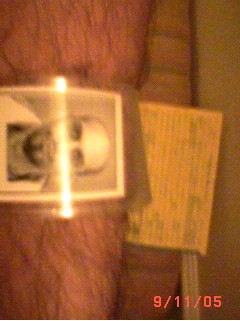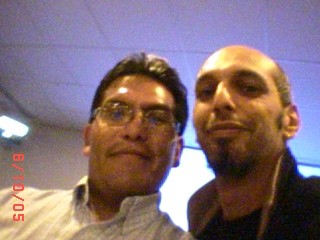Feature:
Deported
for
a
Trace
--
Farid's
Tale
11/18/05
The Drug Policy Alliance's International Drug Policy Reform Conference last week in Long Beach drew not only hundreds of Americans, but also dozens of reformers from Canada, Europe, and Latin America. Among them were representatives of the European Coalition for Just and Effective Drug Policies, an umbrella group representing more than 120 European drug reform and harm reduction groups. But not every ENCOD member successfully completed the journey to Long Beach. ENCOD secretariat Joep Oomen did, but the group's chairman, Farid Ghehioueche, didn't. Instead he was detained at the San Francisco airport, accused of possessing invisible amounts of marijuana, jailed overnight, and deported.
Coming directly from the Wembley Hemp Fair in London to San Francisco, Ghehioeuche was carrying materials related to the hemp fair, DPA conference materials, an old poster for a marijuana march, and CDs containing United Nations Office on Drugs and Crime documents, among other things. Still, in the land of the free, merely carrying such items should not be a problem, right? Wrong. In an e-mail message sent to supporters upon his release, Ghehioueche related his run-in with American authorities. Federal and Santa Clara County documents provided by Ghehioueche corroborate his version of events. This is Farid's tale: "I left London for San Francisco for two days to visit a French friend before the conference. Before I left, some of my friends in France teasingly told me, 'We hope you'll come back alive.' I couldn't have imagined what was about to happen. After the plane landed, Customs agents started to look deeply into my luggage. They asked many questions and interrogated me about my reasons for entering the US. I was sure it was a mere formality, since I was answering all their questions. "As they searched my backpack, they found my computer, a lot of DPA conference documents, more material picked up at the hemp fair in London, and even some UNODC CD-ROMs -- 'A practical guide for competent national authorities under article 17 of the 1998 United Nations Convention against Illicit Traffic in Narcotic Drugs and Psychotropic Substances in French, Arabic, Chinese, and Russian' -- as well as DVDs about ibogaine, ENCOD campaigns, and a Green Avalanche DVD about marijuana that I got in London. Folded away in a pocket of the backpack was a poster from the Global March for Cannabis Liberation from May 2004, which had been there ever since." The Customs officers' suspicions aroused, they swiped the poster and UNODC CD cases and claimed to have detected marijuana. "They said they found cannabis. Then they asked me to come with them in a little cell, for a complete overview and full body search and to test for pieces of marijuana. I didn't know there was any evidence of marijuana. I realized that I should have used a vacuum-cleaner. "I started to get worried, as if I were in a Kafka nightmare. It reminded me of the film 'Midnight Express.' But I felt totally safe because I knew I had brought nothing with me -- all in my head, nothing on my body. Many different agents came by to look at me as if I were a beast in a zoo and kept asking me questions without explaining my rights. I didn't cause a scandal, I just kept breathing deeply and remained calm. "After 45 minutes, one of the agents interrogating me confessed that he was 'a libertarian,' telling me, 'I can confess to you that even some of us would test positive.' But then, they determined that they had found 0.0001 gram of marijuana on my belongings and took me back to another office, where I was detained for six hours. For the first 40 minutes, I didn't know my fate, but after one agent said I would soon be released, Supervisor Lau told the agent to not allow my entry. I realized I was fucked and didn't know what to do. For 0.0001 gram of marijuana, I would not be allowed into America?" Ghehioueche also had the little problem of a 14-year-old arrest for hashish possession in France. While under French law that arrest is expunged, Ghehiouche responded honestly to Customs questions about past arrests, and he paid a price for his honesty. "During my long wait with the inspector, I heard one of her officers say, 'Yes, now we have him.' It was because I answered the question about my arrest in France. But French law is different from the US and I didn't want the US to consider me a criminal, because I am not now considered one in France.
Next, Ghehioueche got a taste of an American jail. Another strip search, photograph, fingerprints, and then behind bars with a motley crew of other rejectees. There, he was introduced to "24 Hours," the paranoid American anti-terror drama, on the jail TV. Ghehioueche's fellow inmates were bemused by the dangerous criminal with whom they were jailed. "I told them I was being denied entry into the US on the pretext of possessing 0.0001 gram of cannabis, and they laughed a lot about my poor case. And you know what else? Ironically, while in the cell, I found a little vial containing a gram of cocaine. If only the Americans legalized pot, they could cut down on the hard drug epidemic. But we were in jail, so one of the prisoners made a straw out of his booking papers and snorted a line off the floor, then put the rest in his shoes." The next morning, it was back to the San Francisco airport for Ghehioueche and other assorted deportees, where he waited until 7:00 p.m. to be put on a flight back to France. In the meantime, though, incorrigible activist that he is, Ghehioueche naturally attempted to convert his keepers to the cause, hammering away at "zero tolerance," the criminalization of youth, corruption, and other evils that accompany drug prohibition -- not the least of which was the ridiculous act of banning a person from the country over microscopic traces of marijuana. "I tried to explain to him that this was a great injustice and totally disproportionate. Certainly, the ridiculous charge keeping me off US soil could be recorded in the Guinness Book of World Records! I also said that about 20 agents had worked on my case and asked him how many real smugglers and terrorists could have taken advantage of those agents being busy with my case. I told him I'm working for drug policy reform because I'd like them to be more efficient and actually achieve real control over risks on the border, not create them by empowering injustice." Farid Ghehioueche is now back in France, but his troubles are not over. "I now have to apply for a visa to enter the US," he told DRCNet. "Homeland Security has given me a number and a file name; they have my fingerprints. I am on their lists now." While Ghehioueche is not too happy with US authorities, he reports that he has received many messages of support and apology from Americans. "It is very good for moral support, and especially coming from US citizens. That shows a real difference between the US administration and its people, as well as a real difference between the US policies and those that people are supporting and expecting internationally." Despite the injustice, Ghehioueche will not attempt to appeal the decision, he said. "I know I'm guilty under their law. They presented the evidence I was carrying such and such an amount of cannabis, although it was just because they said so. I had to tell them I quit smoking cannabis, but I'm not going to lie by saying I'm not a cannabis user."
| ||||||||||||||||||||||||||||||||||||||||||||||||||||||||||||||||||||||||||||||||


